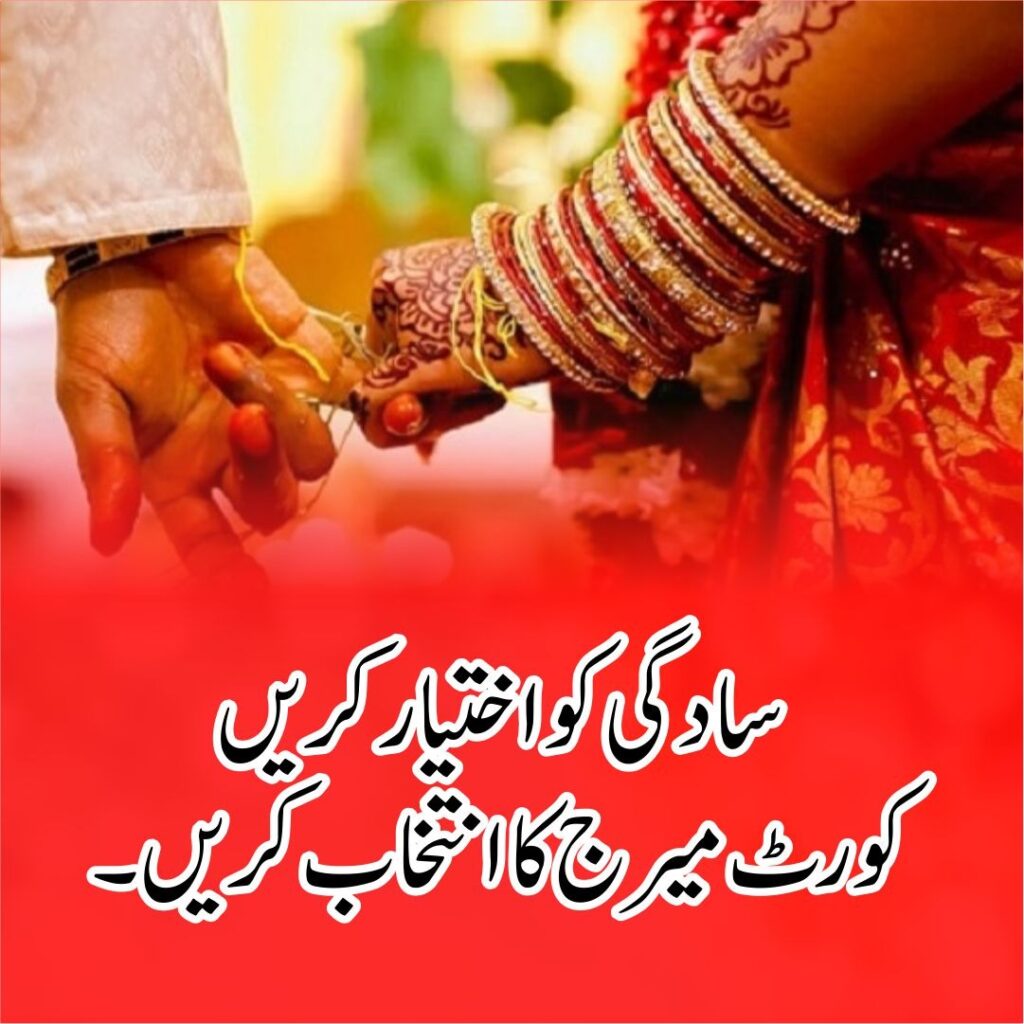- Karachi
- Lahore
- Islamabad
- Leads, UK
- Reading, UK
- Quebec, Canada
Court Marriage in Islam & Pakistan-Court Marriage For Muslim
BLOG By Mohsin Ali Shah, Karachi, Pakistan, Family Law Expert
Court Marriage's Validity in Islam & Pakistan
Court Marriage’s Validity in Islam & Pakistan is underscored by the alignment of such unions with religious doctrines and national laws. This dual compatibility ensures that court marriages are legally recognized and hold religious sanctity within the Muslim community. The essence of marriage in Islam is the mutual agreement between the partners. As long as the Islamic prerequisites of consent, witnesses, and Mahr are adhered to, the marriage retains its validity, irrespective of the venue.
Court Marriage is Common in Many Legal Systems Worldwide
While court marriage is common in many legal systems worldwide, it intersects intriguingly with Islamic principles and Pakistan’s legal framework. This detailed exploration dissects the validity and acceptance of court marriages within Islam and Pakistani law.
In Pakistan, where the legal system is intertwined with Islamic principles, court marriages testify to the possibility of harmonizing traditional religious values with contemporary legal practices. Muslims in Pakistan can now embrace court marriages as a valid and respected form of marital union, bridging the gap between religious obligations and modern living.

Court Marriage's Legality in Pakistan is Grounded in the Constitution of Islamic Republic of Pakistan
Court marriage’s legality in Pakistan is grounded in the constitution of the Islamic Republic of Pakistan and the legal frameworks of the Muslim Family Laws Ordinance, 1961, and the Special Marriage Act of 1872. This form of marriage, devoid of religious ceremonies, allows couples to formalize their union with legal recognition. To engage in court marriage, both parties must meet specific requirements, including being of legal age, providing free consent, and securing two witnesses. The process involves giving notice of the intention to marry and registering with the relevant authorities. The advantages of court marriage include its legal recognition, simplicity, and suitability for inter-religious couples. By understanding the legal aspects and requirements, Pakistani citizens can opt for court marriages as an alternative to traditional religious ceremonies.
What is Court Marriage?
Understanding Court Marriage in the Islamic Context
Islam places significant emphasis on marriage as a sacred contract, or ‘Nikah,’ between a man and a woman. The core Islamic requirements for a marriage to be valid include the consent of both parties, the presence of witnesses, and the bride’s offering of a bridal gift (‘Mahr’) to the bride. From an Islamic viewpoint, court marriage is deemed valid as long as these essential conditions are met, regardless of whether the marriage is solemnized in a mosque or a courtroom.
Court Marriage under Pakistani Law
In Pakistan, a predominantly Muslim country, the legal system incorporates Islamic teachings with civil law, especially in personal matters like marriage. The Special Marriage Act and the Muslim Family Laws Ordinance are pivotal in regulating court marriages. These laws ensure that a court marriage in Pakistan aligns with Islamic principles, requiring the presence of witnesses and the recording of consent, thus making court marriages legally and Islamically valid.
Add Your Heading Text Here
Lorem ipsum dolor sit amet, consectetur adipiscing elit. Ut elit tellus, luctus nec ullamcorper mattis, pulvinar dapibus leo.
Court Marriage Occurs Through Nikah For Muslim Couples
Contrary to common understanding, court marriage in Pakistan occurs through a Nikah ceremony, usually in the office of a family lawyer, a religious union that reflects the voluntary agreement of the couple involved. This method offers a simplified and direct approach to formalizing a marriage without the elaborate legal proceedings often associated with court marriages in other countries.
Societal Misconceptions About Court Marriages
While Islamically and legally valid, court marriages often face societal scrutiny in Pakistan. Misconceptions stem from a lack of understanding about their compatibility with Islamic principles. Education and awareness can play significant roles in changing perceptions, highlighting that the essence of a Nikah, rather than the venue, determines its validity in Islam.
The Role of Consent in Court Marriages
Consent is paramount in Islam and Pakistani law for a marriage to be considered valid. Court marriages reinforce this principle by legally documenting the mutual consent of both parties, thereby upholding the Islamic requirement and ensuring the protection of individual rights within the Pakistani legal system.
Procedure for Court Marriage in Pakistan
The procedure for court marriage in Pakistan involves a few steps, starting with the female partner signing an affidavit of free will. Following this, the couple must fulfill all Islamic conditions for a Nikah, including the Ijab-o-Qubool (proposal and acceptance), the presence of two male or one male and two female witnesses, and the Mahr. The marriage is then registered with the local union council and legally recognized.
Free Will of the Bride and Groom:
- One distinctive feature of court marriages in Pakistan is the emphasis on the bride and groom’s free will. Unlike traditional arrangements where family approval may play a significant role, court marriages through Nikah are characterized by the voluntary consent of the individuals involved.
No Parental Approval Required:
- In contrast to many cultural norms, court marriages in Pakistan do not necessitate the approval of parents or other family members. This allows couples greater autonomy in deciding the course of their marriage without external pressures.
Simple Legal Documentation of Court Marriage:
- Surprisingly, court marriages in Pakistan do not require the lengthy legal paperwork associated with marriages in other countries. There is no need for a marriage license or a legal order from the court of law. The simplicity of the process is a key factor contributing to the popularity of this approach in Pakistan.
Affidavit by the Female Partner:
- The female partner must signs an affidavit, declaring her intention to conduct the Nikah of her own free will. This document serves as a testament to her autonomy in the decision-making process, ensuring that no external factors such as abduction or coercion are at play.
In short, court marriage in Pakistan, conducted through Nikah, offers a unique perspective on the union of two individuals. It stands out for its emphasis on the free will of the bride and groom, the absence of parental approval requirements, and the lack of conventional legal procedures. The signing of an affidavit by the female partner adds an extra layer of assurance regarding the voluntary nature of the union. Understanding this unconventional but legally recognized approach to marriage sheds light on the diverse practices that exist in different cultural contexts.

Is Court Marriage Legal in Pakistan?
Yes, court marriage is legal in Pakistan. The legal framework that governs court marriages includes the constitution of Pakistan, the Muslim Family Laws Ordinance 1961, and the Special Marriage Act 1872. These laws provide a legal basis for individuals, regardless of religion, to marry in court.
Requirements for Court Marriage:
- Legal Age For Marriage: Both parties must be of legal age to marry. In Pakistan, the legal age for marriage is 18 years for both, males and females.
- Free Will For Court Marriage: Both individuals must willingly consent to the marriage without any external pressure.
- Witnesses of Court Marriage: Two witnesses are required to testify about the marriage. These witnesses must be of sound mind and not directly related to the couple.
- Registration of Court Marriage: Registering the court marriage with the relevant authorities is essential to make it legally binding.
Advantages of Court Marriage:
- Legal Recognition of Court Marriage: Court marriages are legally recognized, providing the couple with all the rights and responsibilities associated with marriage.
- Simplicity of Court Marriage: The court marriage process is generally simpler than traditional religious ceremonies, reducing the time and resources involved.
- Inter-Religious Marriages: Court marriages are especially beneficial for couples from different religious or sectarian backgrounds, as they can marry without religious constraints.
Nutshell:
In short, court marriage is a legally recognized method of formalizing a union in Pakistan. It offers a straightforward alternative to traditional religious ceremonies, making it accessible to individuals from diverse backgrounds. It’s essential for those considering court marriage to familiarize themselves with the legal requirements to ensure a smooth and legally binding process.
When examined through the lenses of Islam and Pakistani law, court marriage is a valid form of marriage that fulfills all religious and legal requirements. It offers a blend of adherence to Islamic principles and modern legal systems’ practicalities. Understanding and accepting court marriages as a legitimate option for Muslims in Pakistan can foster a more inclusive and enlightened perspective on marriage practices within the country.
Legal Services
- Divorce Law
- Child Custody
- Family Law
- Financial Law
- Civil Legalation
Syed Mohsin Ali Shah
Phone : +92 316 6644789
Let's Connect
- 0302 66 44 789
- [email protected]
- M-51, M-52, Muneer Mobile Mall, Near Perfume Chowk Jauhar Chowrangi, Block 17, Gulistan-e-Jauhar, Karachi, Pakistan.
- Suite No. 5, 2nd Floor, Laraib Centre, Mangla Road, Karachi Company, G-9 Markaz, Islamabad Pakistan
Some Useful Linka
Online Nikah
Online Shadi
Pakistani Nikah Nama
Online Nikah in Pakistan
NADRA Marriage Certificate
Online nikah & Marriage Documents
Online Nadra Marriage Certificate
English Nikah Nama Form
Urdu Nikahnama Form Online Marriage in Islamabad
Online Nikah in Karachi
Online Marriage in Lahore
Online Marriage in Urdu
Online Shadi in Pakistan
Online Nikah nama Form
NADRA Marriage Certificates
Court Marriage Procedure
Nikah Khawan Services
Court Marriage & Nikah
Court Marriage Law
Court Marriage & Civil Marriage
Nikah Khawan
Online Marriage in Pakistan
Online Nikah Service For Overseas Pakistanis
Online Nikah in Islam
Court Marriage /Court Marriage Fees in Pakistan
Is Online Marriage Valid?
Court Marriage/Court Marriage Offices/Locations in Karachi
Court Marriage in Karachi
Court Marriage in Islamabad
Court Marriage Requirements
Trend of Court Marriage in Pakistan
